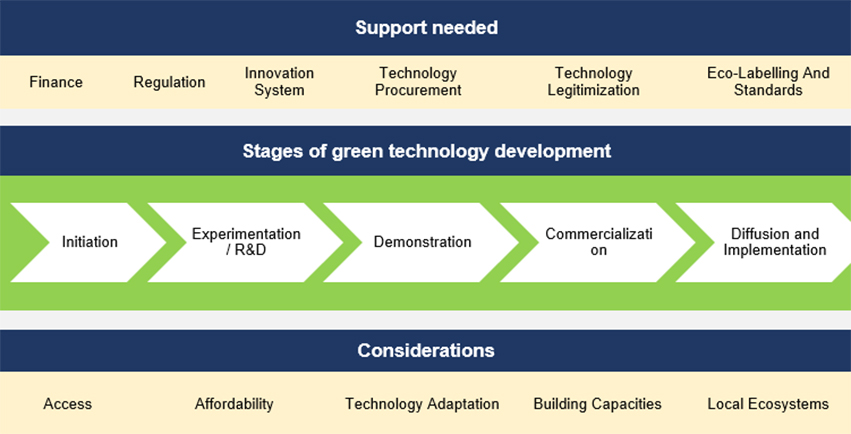
The conventional view is that the technology is primarily developed in the Global North is simply transferred to the Global South. This model has disadvantages since technology transfer involves complex processes of sharing knowledge and adapting to these technologies to meet local conditions. Innovation is not limited to new breakthrough technologies and often involves incremental improvements and adaptations of existing technologies, processes and practices.
Green technologies compete with brown technologies currently in use, most of which have large environmental externalities and other social costs that are not factored into market prices. Private investors are often unlikely to invest in many new technologies without government support, especially when these technologies are not cost-competitive with the technologies that are already in place. Thus, there is a need to reorient market-based approach to innovation-based approach, for which the values are based on interactive learning, information exchange, and coordination between businesses, universities, research centres, policymakers and other stakeholders1.Various instruments are important for supporting green technologies such as financial support for R&D, regulation, technology procurement, technology legitimization, eco-labelling and standards. Private investment and scientific research in green technology is important; however, regulatory, financial, cultural, institutional, and policy instruments are equally important for understanding the problems and designing efficient and equitable solutions2.
Market prices do not fully incorporate the societal costs of using brown technologies, such as greenhouse gas emissions and other environmental risks, with which green technologies compete. Typical market-based solutions to this have been carbon taxes or “cap and trade” schemes aimed at incorporating the societal costs into market prices, along with strong intellectual property rights to encourage investment in green technologies.
Hence reorientation of the markets is an absolute need, mainly to encourage the production, development and diffusion of greener products into the markets. This can be done by adopting an innovation-based approach. A Green National Innovation System (G-NIS) approach emphasizes the public-goods nature of many green technologies into the NIS framework, thereby making it a particularly useful and innovative policymaking tool in the context of long-term sustainable development.
Green technologies can be strengthened by investing in research and development by the private and public sectors. It is also essential to target barriers to its early-stages of innovation/ technology development as access to finance is especially difficult for firms engaged in green innovation, due to the relative immaturity of the market, and thus greater perceived commercial risk. Green innovations and policies can be given an impetus though green investments, demand-enhancing measures, innovation policies, standards, regulatory support and public procurement3.

Through this session, executive heads of various business houses will come together to deliberate on how best can the society move from a market-based approach to an innovation-based approach to develop green and clean technologies, taking a step closer to achieving the sustainable development goals.
The session will be a moderated discussion which will start with remarks (2-3 minutes) by the chair. This will then be followed by the Leadership Addresses wherein each speaker will then get 5-6 minutes for delivering the Leadership Address. Speakers can choose to address all, few or one questions from the listed questions. After this, the chair will ask 1-2 questions based on issues emerging from the discussions from all the speakers present. Finally, the chair will crisply sum up the discussions. Strict time management is to be followed. There will be an on-screen timer for the same.
The Energy & Resources Institute
6C, Darbari Seth Block, India Habitat Centre, Lodhi Road
New Delhi - 110 003 India
Email : wsds@teri.res.in
Ph. : +91 11 24682100 (Ext. : 2467)